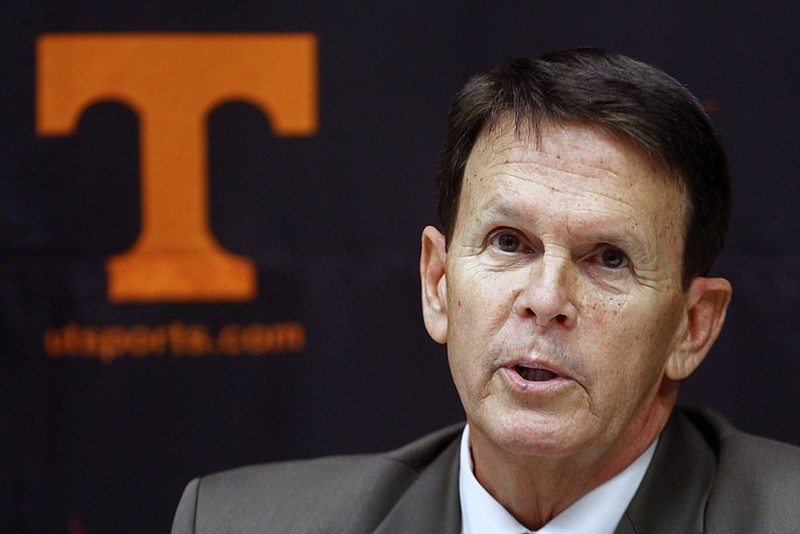Never let them see you sweat.
That's the advice we often embrace in times of crisis and uncertainty. Stand tall. Stand firm. But also stand quietly, as if you're completely deaf to the outside noise and criticism.
It's normally sound advice. And it's probably the advice a lot of folks would have given the 16 head coaches within the University of Tennessee athletic department Tuesday, just before they somewhat surprisingly chose to address the media concerning a lawsuit that claims a "hostile sexual environment" exists on the Knoxville campus.
But did these coaches make a mistake?
Should they have let the school's lawyers do their jobs behind the scenes before creating one of the most amazing scenes ever seen in big-time intercollegiate athletics - 16 head coaches, both men and women, all together at the same time, truly "One Tennessee"?
Well, One Tennessee except for the man who's insisted on shoving that theme down everyone's throats, athletic director Dave Hart, who apparently had previously scheduled business elsewhere. But more on that later.
Moreover, can the mere words of the highest paid of those coaches - UT football boss Butch Jones - truly sway the moms and dads and coaches of recruits who may have grown nervous with the perceived atmosphere around K-town?
Said Jones: "We have great individuals in this entire athletic department. We have a very good culture. That's why I said we're going to defend our culture. We have good people. They're embarrassed by it. They're upset about it. They know that's not who we are."
And he may well be right. I've covered Big Orange athletics for more than 30 years. While the vast majority of UT's athletes in all sports have always been good, decent young people, I've never seen a time when I've felt they had more good, decent student-athletes - emphasis on "student" - than right now, including football and men's basketball.
That said, Jones was also the only coach of the group to have had seven players charged with either sexual or domestic assault during his three-plus seasons atop Rocky Top.
And because of that, no one seriously thinks this remarkable show of solidarity and camaraderie, however admirable, is going to seriously deter rival coaches in all sports from using UT's damaged image against it.
But that doesn't mean the coachs' decision was necessarily wrong. For what if you were one of these coaches sweating blood, sweat and tears over that lawsuit? What if you saw all you'd spent a lifetime to build - your career, your program, your reputation, especially your reputation - suddenly in jeopardy for something you not only had no part of but also had no control over?
What would you do then? Could you stand tall and firm and silent against the lies and rumors and ridiculous statements that daily fill social media? Could you shrug off the image rival recruiters are starting to paint of your once proud athletic department, the one that used to dominate almost every sport except football and men's basketball?
When you're pretty sure the kids you're coaching are making good grades and good choices, could you turn the other cheek, look the other way, hoping and praying that words never will hurt your program?
Not so easy, is it?
So while each of the Vols' 16 coaching candles shed light on all that's good and wholesome and attractive about UT, two of their women coaches may have provided the most enlightenment to why this gathering was called.
Said Lady Vols coach Holly Warlick: "Is (the lawsuit) being mentioned in recruiting? Yes. (But) If I had a daughter, I would not hesitate one bit for her to come on campus."
Added softball co-head coach Karen Weekly, who once helped her husband Ralph build the UT-Chattanooga program: "The culture here right now is the best it has ever been. Those stories aren't being told. The image that is being displayed of our culture is unfair."
You could say that Hart's absence was unfair, whatever the excuse.
If you're going to toss away the iconic Lady Vols brand over the marketing slogan "One Tennessee," shouldn't you stand as one with your employees in their time of need? Are we really to believe that wherever Hart was Tuesday morning and whatever he was doing was more important than being there for the faces of his department, all those men and women he counts on so mightily to win enough games to move his $100-million-a-year budget to black rather than red?
And if Hart really felt the need to be somewhere else, should UT chancellor Jimmy Cheek not have said, "No, you support the guys in the line of fire"?
If this news conference had to be held, how could it be staged without the leader of the department? How can you have One Tennessee when the one with the biggest title isn't around?
A second unfairness may be the beating the greatest Vol, Peyton Manning, took over his very limited mention in the lawsuit over a 20-year-old "mooning" incident.
If John Adams' excellent piece in Sunday's Knoxville News Sentinel about former trainer Jamie Naughright is even 50 percent accurate concerning her colorful language and continued disparaging of Manning, why shouldn't Manning receive a settlement for her breaking a nondisclosure agreement as she once won one against Peyton for his breaking an earlier nondisclosure agreement between the two?
As he addressed the media on Tuesday, Jones said, "I tell our football team the actions of one reflect on all."
One could also say that the actions of all 16 UT head coaches reflected both well and badly on their boss, since never letting them see you sweat should never be confused with never letting them see you.
Contact Mark Wiedmer at mwiedmer@timesfreepress.com.
